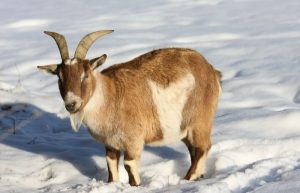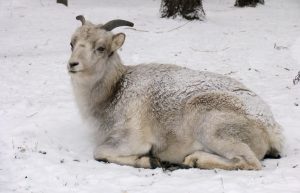
What You Need to Know About Goats Getting Cold
Weather can sometimes affect the health and comfort of your livestock. If you have goats and are preparing for the winter months, you may be wondering how well your goats will handle the weather and if there are any special precautions you should take to help them deal with the cold.
Do goats get cold? Goats are known to be very cold-hardy, meaning they can flourish even in sub-freezing climates. Goats can survive even extreme temperatures as long as they have an adequate shelter that keeps them dry. Goats can develop hypothermia if they are wet and out in the cold.
Winter months can bring extra challenges when it comes to caring for your goats. Understanding the needs of your goats for the cold seasons can help you prepare ahead of time. To learn more about caring for your goats in the cold, keep reading!
What Temperatures Can Goats Survive In?
A healthy adult goat can survive in temperatures ranging from below 0°Farenheit (-18°Celcius) and above 100°Farenheit (38°Celcius). Goats are one of the most heat-tolerant and cold-tolerant livestock you can find, living in climates with extreme sub-freezing temperatures like Alaska and Russia and also in arid environments with desert climates like Africa and the Middle East.
The goats’ secret to being able to stay cool in the heat as well as warm in the cold is their double-layered fur coats. The inner layer of fur is called cashmere and is much like a sheep’s wool fleece. The cashmere is soft and fluffy, helping to insulate the goat’s body heat by keeping out both hot and cold outside temperatures. The outer layer of fur is more coarse and protects the goats from the elements.
Pygmy goats are one of the many goat breeds that can flourish in both hot and cold weather. Did you know you can buy a pygmy goat for relatively cheap? To learn more, check out my article How Much Do Pygmy Goats Cost? Buying Guide.
How to Help Goats Survive in the Cold
Although goats can survive out in the cold by themselves just fine, there are some extra precautions you can take to make it a little easier on them. Here is a list of things to consider when it comes to keeping goats in the cold:
Give Your Goats a Shelter Where They Can Stay Dry
One of the most important things to aiding your goat’s survival in cold weather is to ensure they have a shelter where they can escape wet and inclement conditions. There’s one situation where cold weather can become dangerous to your goats, and that’s when it’s not only cold but it’s also wet.
Cold and wet is the perfect combination to cause hypothermia; hypothermia is when the core body temperature falls below the normal body temperature. At this point, vital organs can start shutting down and it can become more difficult to function. Hypothermia can lead to death if the body temperature does not rise back up to normal.
While your goat’s double-layered fur may protect them from extreme temperatures, it can also trap cold water to the skin of your goat once the water has soaked through. This can cause your goat to shiver and also develop hypothermia. If you notice that your goat is acting lethargic and is cold to the touch, it may have hypothermia. If your area is going through a spell of cold and inclement weather, it’s a good idea to check on your goats more often to ensure they aren’t developing signs of hypothermia.
Did you know that goats can get fleas? Yeah. If your goat has fleas, you can find help here: Do Goats Get Fleas? Essential Goat Care.
Provide Your Goats With a Sleeping Area Off the Ground
If you enjoyed science class as a kid, you may remember how hot air rises while cold air sinks. This means that the coldest air tends to settle right above the ground, which can be uncomfortable for livestock trying to rest and stay warm. One way you can make your goats’ sleeping areas a little cozier is by building them a sleeping platform that’s raised off the ground.
This can be as simple as putting wood pallets down where your goats usually sleep. Even by raising the platforms a few inches from the floor, you’re helping the goats escape the cold hard ground. Goats are climbers and love to be up high, so they may also enjoy a resting area that they have to jump onto.
Give Your Goats Extra Bedding for Comfort and Insulation
 You may be thinking sleeping on a wooden platform isn’t any better than sleeping on the cold hard ground. Another great thing you can do to add your goats with an extra level of comfort during the winter is to put extra insulating bedding down on their sleeping platforms or in their shelter. This can prevent cold air from settling and can help keep your goats warm as they rest.
You may be thinking sleeping on a wooden platform isn’t any better than sleeping on the cold hard ground. Another great thing you can do to add your goats with an extra level of comfort during the winter is to put extra insulating bedding down on their sleeping platforms or in their shelter. This can prevent cold air from settling and can help keep your goats warm as they rest.
Providing extra bedding means you’ll have to clean more often. Soiled bedding, especially straw, can get moldy and cause poor ventilation if not removed from the area. During cold months, your goats may be in their shelters more than usual, so they may make more of a mess than you’re used to.
Provide Your Goats With a Daily Supply of Hay
Goats are foragers, meaning they spend the majority of their day eating and browsing. While goats will eat grass, they also love to eat bark, shrubs, leaves, and sticks. During the winter months when vegetation dies off, it’s important to properly supplement your goat’s diet; one of the best ways to do this is by supplying your goats with hay.
Goats eat up to 4% of their body weight daily, meaning that they need something they can munch on throughout the day. Hay provides them with the fiber and roughage they need to produce energy. One way goats stay warm is by eating, since food can be turned into energy used to warm their bodies.
While you can feed goats grain for extra nutrients and fat, goats cannot live on grain alone. Your goats will require a daily supply of hay or forage to help them stay warm and healthy.
Young Goats and Susceptible Goats May Require Extra Protection From the Cold
While healthy adult goats are very cold-hardy, young kids, pregnant goats, unhealthy goats, and older goats may require extra protection from the cold. In extreme conditions, it’s best to bring these goats inside. You can use a heat lamp to provide kids with extra warmth.
For the others, keeping them inside caring for them with a watchful eye may be enough. Although, if you notice a goat struggling, you can put a goat coat on them for an extra layer of warmth. There are goat covers designed to insulate body heat and work to keep the goat warm.
Make Sure Your Goats Have Access to Fresh Water
Unfortunately, livestock can suffer from dehydration during the winter as cold temperatures cause water tubs to freeze over, blocking the animals from getting any water. Rapid changes in weather and outside temperatures can also make it difficult for the goat to regulate it’s body, making it more difficult to conserve water.
Dehydration can rapidly affect goats and even cause them to die. Dehydration can also lead to other health problems in your goats, like fever, lack of urination, and lethargy. It’s important that your goat always has access to fresh water. If your area regularly deals with freezing temperatures, it’s a good idea to get a water heater for the water tub you use for your goats.
There are some tricks you can do during the cold months to help your goats get more water. You can add water to their grain so they’ll consume water as they eat. You can also provide them with a salt block, as consuming the salt can cause the goats to want to drink more water. If all else fails and your goat is dehydrated, you can use a syringe to squirt water into their mouth.
Give Your Goats the Option to Go Outside, Even if it’s Cold
Even if it’s cold outside, it’s important to give your goats the option to go outside. As livestock meant to browse and forage, immobility can cause negative health effects in your goats. Giving your goats the opportunity to go outside can help them stay healthy and happy. Providing your goats with climbing obstacles and feeding stations can help them stay mobile and closest to their natural state.
Goats are smart animals and will find their way inside if the weather turns bad. Goats will also stay together, so if one goat goes into the shelter, the other goats will shortly follow.
Colder weather can affect livestock and poultry in different ways. To learn more about caring for animals in cold and wet climates, read the articles below!
